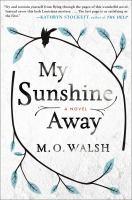
Close your eyes for a moment and remember the gang. You know, the one from your old neighborhood. Those kids you ran wild with when it was OK to be kids outdoors. Now imagine an act of violence by an unidentified assailant against one of those friends, and you’ve got M.O. Walsh’s My Sunshine Away.
I strongly identify with our narrator. He’s completely honest in his youthful self-absorption and total lack of insight. Alternately a suspect in the investigation, then absolved, a suspect once again, he himself never quite denies this guilt or claims innocence. And the struggle for truth is somehow inside himself. At novel’s end, his realization is that “Life is not always about me and the unloading of my conscience.” When I look back at my youth, blessedly devoid of tragedy, I can relate.
Walsh’s writing is rich and powerful. I could feel the heavy Louisiana heat pressing down, even as I sat near the air vent. Baton Rouge, New Orleans’ ugly step-sister, is a character in her own right. Responding to Hurricane Katrina, those dislocated, those who settled, and those who left. Her personality sustains her, and Walsh pays tribute here.
My Sunshine Away reminds me a little bit of Stephen King’s The Body, where a bunch of innocent kids see, or come to know about, something they shouldn’t have to know. Or Laura Moriarty’s The Rest of Her Life, where a young high school student is responsible for another girl’s death. Their responses to those experiences are neither right nor wrong. Their responses are simply their responses.
